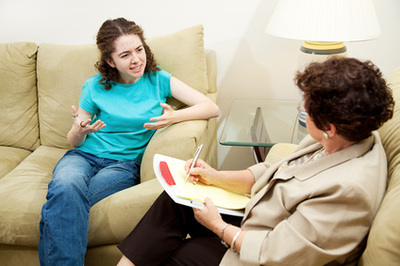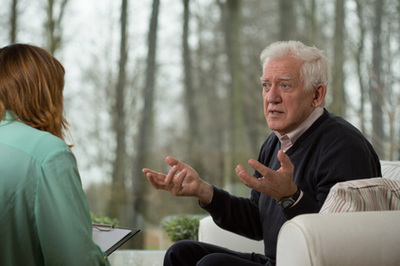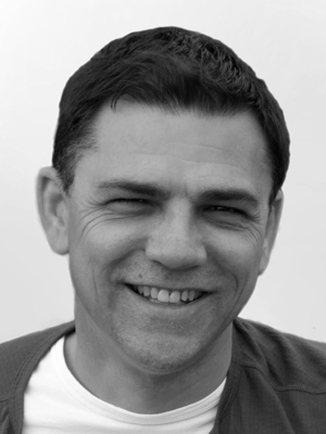|
Do you feel like the woman in the photo, and are wondering about counselling? You've not tried it before, but are wondering whether it might help, and need a no nonsense guide to what counselling is all about. The following article looks at the practical and the not so practical aspects, lifting the lid on some of the jargon used in counselling, and giving you an idea what to expect from counselling, as well as a nose under the bonnet look at how counselling works. My article, choosing the right counsellor, looks at the best way to narrow your choice of counsellor, when searching through counselling directories. The rest of this article looks at making first contact and what to expect from your first few sessions. Often the hardest part of going to see your chosen counsellor, is making that first contact. Personally I recommend picking up the phone and talking directly with the counsellor you are considering. This will give you a chance to get a feel for how comfortable you felt talking to them. This is the first stage in working out whether they are right for you. You may however prefer to email, and while this is OK, it will give you less of a sense of how you might get on. One thing I have noticed that is not often talked about in guides to counselling, is that people often feel anxious, making the first phone call, and making the first visit. It is normal to feel anxious, you are after all planning to share your personal thoughts and feelings with a stranger! Your counsellor will make allowances for this when you are on the phone, and when you first come to see them. Common worries you might have are, "He/she will think I'm stupid/inadequate/mad," "My problem is too small, I'm wasting his/her time," "My problem is too big," "I won't know, what to say, I'll clam up, and there will be an awkward silence." Rather than seeing these worries as a barrier, treat them as a guide to how well your first session went. These worries are telling you what is important to you, "I don't want a counsellor who gives me the impression I am stupid," "I want someone who takes my problem seriously," "I want someone who won't collapse when I tell them my problem," and "I want someone who helps me feel at ease" The first session: Do prepare for your first session. Think about the questions you might want to ask your counsellor. If it helps write them down and take them with you. Leave in plenty of time. You are likely to be feeling anxious already, and being stressed because you are running late and can't find a place to park will make this worse. If you feel very anxious, slowing breathing and lengthening the exhale, can help you to stay in control. You may want to try the 60 second tranquiliser, or pause and ready yourself just before you go in to see your counsellor. The aim of the first session is for you to find out about your counsellor and how they work; have the opportunity to talk about your problem; and for you to get a feel for your counsellor's approach to therapy. During the early part of the session, your counsellor will probably do most of the talking. They should explain things like, how much the sessions cost, how much notice you have to give if you need to cancel an appointment, and they should also make sure that you understand counselling confidentiality. Feel free to ask questions, most counsellors will ask you if you have any questions. Some counsellors may also take notes during the very first session. At some point in the conversation, there will be an 'over-to-you' moment, allowing you to begin talking. This might well start with an introduction, such as "tell me a bit about yourself." You could also be asked to talk about your family history, who is important in your life, or your interests, before you begin talking about what has brought you to counselling. At the end of the session, signs that you have found the right counsellor for you are; feeling comfortable talking to them, a feeling of being heard/understood, a feeling of being accepted or not being judged, a feeling that your counsellor is honest/genuine. If you did have some worries about going to see a counsellor, having a mental check to see if you are still as worried is also a useful gauge. A really good sign, is if you have already told your counsellor about your worries of going to see them. As well as deciding with your counsellor whether you want to continue with them, you might also want to talk about how long you will work together, and how your counsellor will work with you to help you with your problem. How does counselling work?: Counselling is a form of helping based on a relationship between you and your counsellor. This relationship has three essential parts; understanding (empathy), acceptance (unconditional positive regard), and genuineness (congruence). Being offered these things helps you to learn how to offer them to yourself, gaining a better self-understanding, being more accepting of yourself, and being more genuine. In counselling jargon, they are called the core conditions*, and are the magic ingredient that helps counselling work. Counselling works mostly with feelings. Basically there are two systems people use to solve problems; (1) a slow thinking system, which (mostly) plans for the future, and (2) a fast emotional-feeling system, which provides feedback on what is happening now. When one system is very active, the other tends to be quiet, so if we are thinking alot we tend not to notice what is going on around us or in our bodies, while if we have very strong feelings we tend to find thinking things through very difficult. Most people tend to spend much more time thinking rather than feeling. Counselling aims to build a better balance between these two systems, and it does so by building up your awareness of how you are thinking and feeling. The classic counsellor question "How do you feel about...?" is an invitation to pay attention to this often ignored emotional-feeling system. Getting the most out of your sessions: Being determined to make changes is the single most important factor in how successful therapy is. There are 168 hours in the week of which only 1 will be spent with your counsellor. How you use those 167 hours in between sessions can make a big difference to the success of the counselling. Reflecting on what you have talked about with your counsellor on your own or with another person is often time well spent. Also putting the things you've talked about into practice can also pay big dividends. That emotional-feeling system I talked about earlier learns by experience, it needs practice. One of the more difficult aspects is what to do if you're not happy with your counsellor. The simple answer to this is to tell them, which is much easier said than done. However, in my experience as a counsellor, some of the most significant pieces of client learning - called therapeutic movement in counselling jargon - has come when my client has told me they were unhappy with something. Sometimes, after counselling you may feel elated, and then feel a slump a few days later. This is a very common experience - change can be uncomfortable. It can be part of the intial experience of counselling. A strong feeling of relief having spoken to somebody, followed by a drop in mood as reality sets in again. This should be a temporary feeling, and will get less pronounced as you make progress in your therapy. Making changes can be hard work, which is why taking care of yourself is often strongly emphasised in counselling. One of the questions that oftens comes up, is how many sessions will it take, which is a hard question to give a precise answer, because it depends on lots of different factors. Typically, however you should start to notice a benefit starting around the 3-6 sessions mark. If you don't notice some benefit by then, then this is something I recommend you talk to your counsellor about, as you may need a change of approach or perhaps work with somebody new. Most people however will achieve what they want in around 4-10 sessions. Counselling can be a surprising process. It's a bit like peeling an onion, as you peel away one layer, another layer lies underneath. So really counselling finishes, when you decide you have peeled back enough layers. And how you end counselling is a whole subject all in itself. Of course counselling does not always look like the title photo, most of the time it looks more like the photos in the gallery below. As well as time for being serious, there is also time for lighter moments, and celebrating success is as important as looking at problems. Title photo © WavebreakmediaMicro *the core conditions, comes from the Person Centred Approach developed by Carl Rogers. Other approaches employ related concepts. For instance my approach which is Humanistic Gestalt, uses Inclusion (empathy), Presence (congruence), and Confirmation (Unconditional Positive Regard). The second part of my explanation draws on the work of Daniel Kahneman, and his book "thinking, fast and slow" to provide a slimmed down explanation of how counselling works. Many counselling approaches draw on philosophical rather than neuroscientific or psychological roots as a source of explanation.
0 Comments
Your comment will be posted after it is approved.
Leave a Reply. |
Categories
All
Archives
January 2021
|
BioI'm Mark, a Humanistic Counsellor. |
Home - Testimonials - Articles - Links - Contact - Book Appointment - Counselling Students - Privacy Policy - Terms
Mark Redwood, BA (Hons) Counselling, MBACP
© Mark Redwood 2015, 2016.2017 | Main portrait by Doug Freegard © 2015







 RSS Feed
RSS Feed